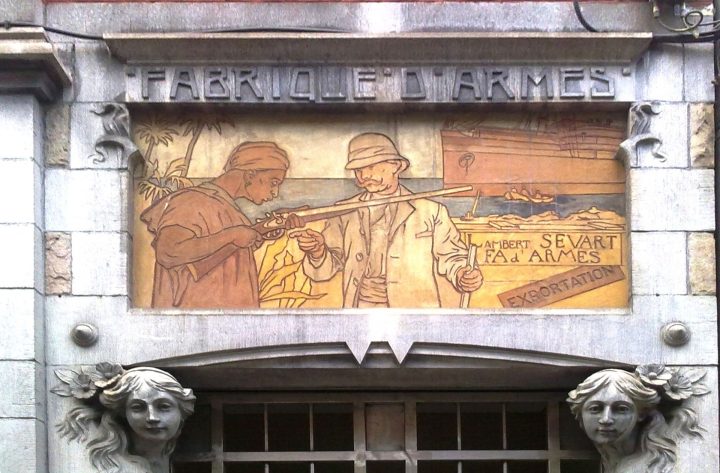We must expose where public dollars are really being spent and boycott or divest from the enterprises that profit from selling munitions that kill.
Western governments were quick to express their outrage at Turkey’s invasion of northern Syria to clear it of Kurds, resulting in the displacement of more than 275,000. Ten countries—including the United States, which ignited the crisis to begin with by withdrawing its troops to facilitate the invasion—announced an arms embargo as punishment for Turkey’s aggression.
The United States, the largest arms exporter to the pariah du jour, just as quickly revoked its ban as soon as a ceasefire took effect—after, of course, Turkey achieved its goals.
“It will engender a real humanitarian disaster,” decried French Foreign Minister Jean-Yves Le Drian.
“This is not the action we expected from an ally. It is reckless and is counterproductive,” added British Foreign Secretary Dominic Raab.
It might seem that these are welcome signs of a newly invigorated moral conscience among EU governments. However, a broader analysis of arms sales as an instrument of foreign policy suggests otherwise. Consider the war on Yemen waged by the Saudi Arabia-led coalition. The death toll in that conflict is fast approaching 100,000, with nearly 5 million Yemenis displaced. The Armed Conflict Location and Event Data project found that while the Iranian-backed Houthis are responsible for somewhere around 16% of the fatalities, the Saudis and their allies (the UAE, Sudan, Egypt and Morocco) are the cause of the majority: 67%. Since entering the Yemen conflict in 2015, the Saudi kingdom has become the world’s biggest weapons importer.
Selling those arms to the Saudis, as well as the UAE, are many of the same players claiming the moral high ground for slapping an embargo on Turkey—including the United States (despite attempts by American legislators to stop it), the United Kingdom, France, Germany, Spain and Italy. The U.S. is by far the biggest supplier, with the U.K. coming in second until recently. In June, the UK court of appeal charged Prime Minister Boris Johnson with signing off on arms exports to Saudi Arabia without properly assessing civilian risk. In response, the government promised to withhold any further arms-export licenses for Saudi sales, but has already violated that commitment, forced to apologise earlier this month for two breaches.
One country stands out as doing more than its fellows: Germany. Angela Merkel’s administration froze arms sales to Saudi Arabia in March, extending through the same month in 2020. Likewise, Germany announced it will not issue new permits for “armaments that could be used by Turkey in Syria.”
How those weapons are different from others is not clear, however, and thus that promise needs to be investigated.
This should not be surprising, given that many of the same countries who boast of an ethical stance with Turkey while arming Saudi Arabia also provide material support to Israel, which has oppressed the Palestinians for more than 70 years. In fact, the Israeli government is an exemplar of crassly self-serving foreign relations. Israel has sold arms both to the Kurds and the Turks, sometimes at the same time, depending on the way the wind blows.
“How can we explain Israeli support for the Kurdish people in both practice and rhetoric, while it simultaneously arms one of the main forces oppressing Kurdish people?” asks Sahar Vardi, one of the founders of Hamushim, a project challenging Israel’s military industry and arms trade, in an essay in 972 magazine: “The answer is rather simple: Israeli governments have supported the Kurdish people when it has been convenient and backed their oppressors when that better served Israel’s political and economic interests.”
Arms sales by governments are not about ethics, human rights or morality. They are dictated by profits and politics. If civil society and business want to chart a way to a more humane and just social order, we must be our own watchdogs and follow the path of the activists and companies that helped bring down apartheid South Africa: We must expose where public dollars are really being spent and boycott or divest from the enterprises that profit from selling munitions that kill to governments that use them to oppress.
An example of how to start can be found in an online tool called Weapon-Free Funds. Created to fight what it calls the “war machine,” the site—established by two U.S. nonprofits, CODEPINK: Women for Peace and What You Sow—allows anyone with internet access to find out whether their investments are funding weapons manufacturers. Think how powerful such a tool could be if it was expanded to connect countries committing documented atrocities to the governments selling arms to them and the companies making money off them? That would be the first step in giving power to the people who need to push for a truly moral foreign policy and an ethical code of business conduct.










